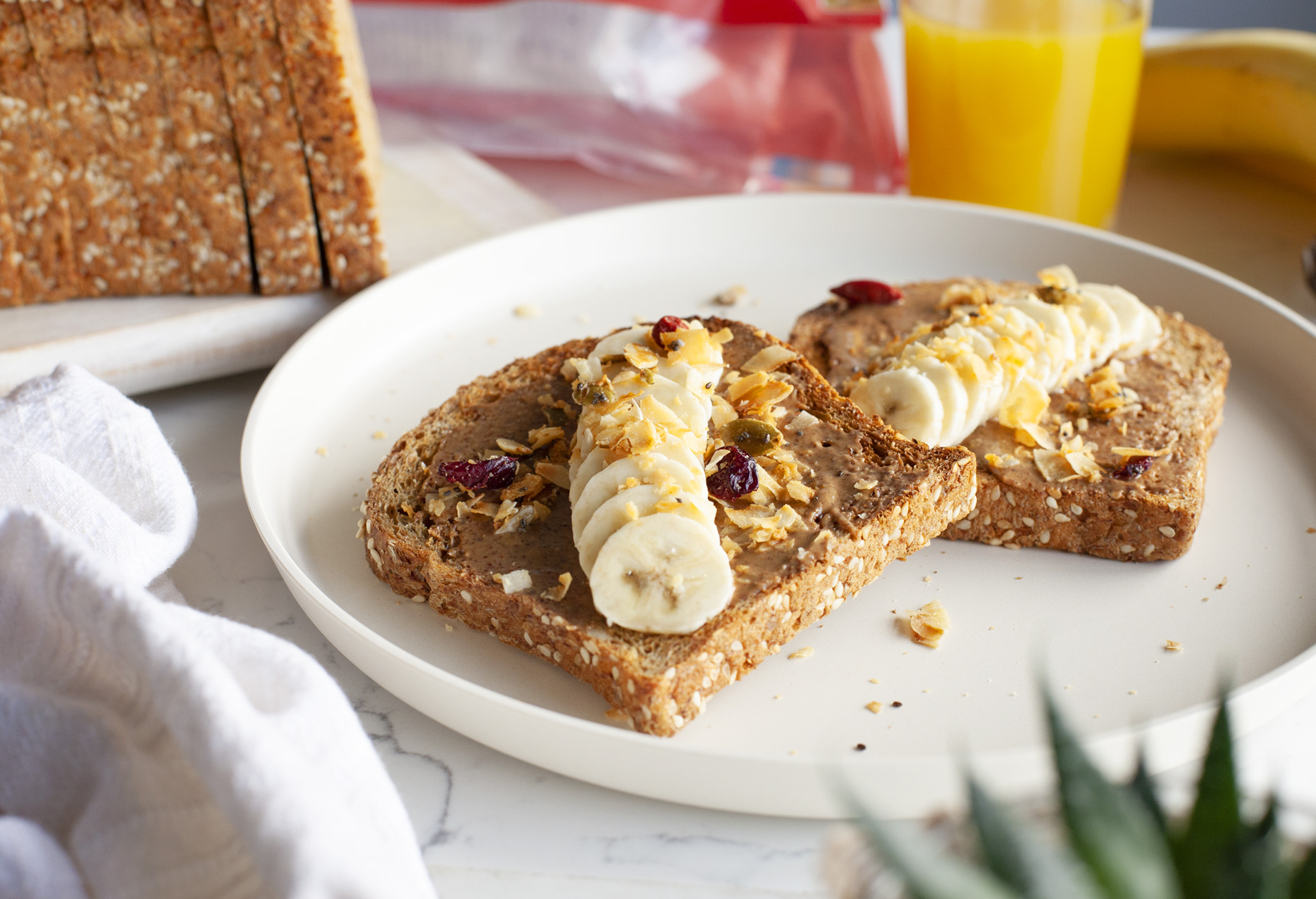Our Philosophy

We opened Silver Hills Bakery in 1989 with a mission to empower people by providing healthy choices. We believe investing in your own health is the greatest gift you can give someone because when you’re healthy, you’ll have more to share. By caring for one another and the planet, we create a truly healthy world. Making foods with care and purpose from sprouted grains and a simple list of ingredients, we aim to see to it that the nutrient-dense power of sprouted foods is shared in as many places as possible.
Our Values
We are committed to making the best tasting, most nourishing, plant-powerful products possible. Our devotion is our promise, you can count on the pure authenticity and healthy goodness of our products. Everything we put in, you get out. All of our 100% plant-based products are made with nutrient-rich, high-fibre whole grains sprouted in clean, cold Canadian water. Each ingredient is guaranteed non-GMO, the way food is meant to be.
Investing in our Health
Our biggest investment in life isn’t financial. Making our health a top priority means we have more to give to the people around us. Sometimes it’s the little things that make the biggest difference in life. Our delicious, naturally nutrient-rich foods provide wholesome, balanced energy to support all your pursuits.
Non-GMO
As the first verified non GMO bakery in Canada to create sprouted whole grain, non GMO bread – it’s safe to say we’re passionate about keeping genetically modified organisms (GMOs) out of all our products. Every ingredient Silver Hills uses is guaranteed to be non-GMO, the way we believe food was meant to be.
Plant-based Nutrition
We believe plant-based eating is a cornerstone of personal health, and also improves the environment. Producing and consuming plant-based foods reduces methane emissions, saves water, and protects wildlife habitats. Plant-based foods offer more vital nutrients, which power your days with vibrant and restorative energy.
Empowering Others
Caring for one another and our community creates a healthier world. That was the founding principle of Silver Hills Bakery. When it comes to health, what’s good for us just so happens to be for the greater good. Healthy people means healthy communities that appreciate, protect, and benefit from the inherent goodness of our planet.
Simple Living
Living your best life doesn’t have to be complicated. Making small, simple choices every day has powerful long-term benefits. Choosing foods that renew and support good health is our greatest tool for living life to our fullest, most meaningful potential.
Truth
The pursuit of truth is at the core of a meaningful life. We believe you deserve to know as much as possible about your food and how it is grown and made. We are committed to transparency throughout our entire process, from meticulous selection of all-natural ingredients to the cherished artisanal methods that nourish our family and yours.
Our Commitment
Good health is a journey, and our family’s biggest investment. We’ve developed a profound appreciation for the vitality of nature, organic farming, and simple ingredients to promote lasting wellness and complement busy lifestyles. Raising children, we were gifted an intimate understanding of how plants, especially sprouted grains, are powerful allies for optimal well-being.
No to GMOs
As the first verified non GMO bakery in Canada to create sprouted whole grain, non GMO bread – it’s safe to say we’re passionate about keeping genetically modified organisms (GMOs) out of all our products. We demonstrate this by our association with the internationally-recognized Non GMO Project – a non-profit organization committed to preserving and building the non GMO food supply.
What’s the deal with GMOs?
Before we can talk about being Non-GMO, we first need to explain what GMOs are. GMOs – or genetically modified organisms – are plants and animal species created through gene splicing or biotechnology, also referred to as genetic engineering (GE).
In the plant world, most GMOs were created to withstand pesticide applications or extreme temperature ranges (such as drought). The intended outcomes were improved nutrition or higher crop yields.
Proponents of the GMO movement maintain that GMO crops are safe to eat, more nutritious, strictly regulated, environmentally beneficial, and an aid in addressing world hunger. The truth is that, in many cases, GMO crops have demonstrated the opposite effect and have instead raised many questions about consumer and environmental safety.
Add to that fact, here in Canada and the US, governments have approved GMOs for use based primarily on studies conducted by the very companies that created the GMOs and will, subsequently, realize profits from their ongoing sale and distribution.
After years of being told “there is nothing to worry about” consumers are beginning to gain awareness. They are becoming more educated about GMOs, and the potentially negative impact they could have on both our health and our environment.
GMOs in the food chain
There are a number of crop strains that have, at some point, been bio-engineered and are therefore, deemed to be at risk of being GMO: alfalfa, canola, corn, cotton, flax, oil, papaya, rice, soy, sugar beets, yellow summer squash, and zucchini. Ingredients derived from these risk crops are often used in the bread-making industry, such as amino acids, citric acid, flavorings, sugar, sucrose, vegetable oil, vitamins and yeast products. We also know that animal byproducts such as milk, meat, eggs, honey and other bee products are at risk as well, due to potential contamination from feed and other input factors.
Since wheat was never approved for GMO testing or sale in North America, it was not originally one of those crops considered to be at risk. This changed with the discovery of GMO wheat in an Oregon field in May 2013. The incident has raised serious questions about the safety and validity of GMO experimentation performed in an uncontrolled environment (eg. outside). No longer can scientists guarantee us that GMO grains will not contaminate other crops.
The Non GMO movement
With medical and scientific evidence indicating GMOs do not appear to be the answer to better nutrition, improved yields and reducing world hunger, a growing consumer movement has been gaining momentum. Consumers are now demanding to be informed about the presence of GMOs in the food chain and have put increasing pressure on their governments to be more responsive to the numerous issues associated with GMOs, in many cases, specifically asking that GMOs not be used in food products and, if they are, that mandatory labeling be imposed. While more than 50 countries have banned GMOs, North American governments have been slow to respond.
Non GMO Bread Testing & Traceability
In light of the recent GMO wheat case in Oregon, testing wheat for GMO’s has now become a necessity for Silver Hills Bakery as this development gives rise to the possibility that not all bread can be considered non GMO bread. We were one of the first to voluntarily implement mandatory GMO testing for all of our wheat. To reassure our customers that our bread is completely free from GMO each and every lot of wheat is tested for both quality and genetic composition.
And while using government-approved GMO ingredients, like corn syrup, molasses or vegetable protein, is widespread in the bread-baking industry, Silver Hills Bakery has always used non GMO wheat and other baking ingredients. Our facilities and our products are regularly inspected to ensure all our ingredients comply with non GMO food standards.
Silver Hills Bakery has always believed that you should be able to trace the ingredients in your food back to the farms where they originated. So you can be sure that you are getting the best, most nutritious, “as nature intended” products for you and your family.
Additional Resources
Non-GMO Project
Seeds of Deception
Healthy Recipes & Sprouted Inspiration
Sprouted bread is one slice of our mission to empower, educate, and inspire healthier lives. From delicious plant-based recipes that help you make healthy meals in minutes, to stories that help you make small choices matter, we’ve got you covered.





